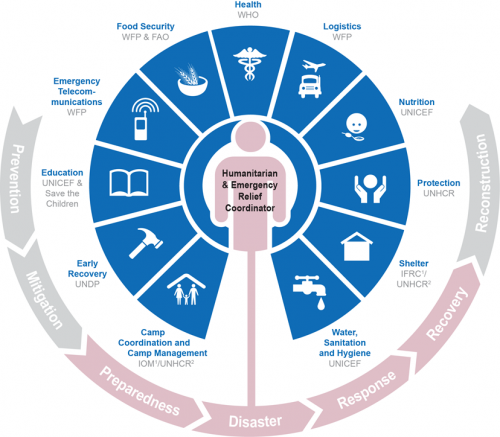
As a frequent contributor to this column about partnerships I’m constantly on the look-out for good practices. Living in Siraha during the April and May earthquakes I didn’t really get to observe how the UN Cluster system operated. However, coming to Kathmandu in July enabled me to observe how this incredible partnership operates with the United Nationals Office for the Coordination of Humanitarian Affairs (OCHA) ensuring that the system works.
“The foundations of the current international humanitarian coordination system were set by General Assembly resolution 46/182 in December 1991. Almost 15 years later, in 2005, a major reform of humanitarian coordination, known as the Humanitarian Reform Agenda, introduced a number of new elements to enhance predictability, accountability and partnership. The Cluster Approach was one of these new elements.
Clusters are groups of humanitarian organizations, both UN and non-UN, in each of the main sectors of humanitarian action, e.g. water, health and logistics. They are designated by the Inter-Agency Standing Committee (IASC) and have clear responsibilities for coordination.” [1]
There are 11 clusters running the gamut from disaster preparedness and mitigation to reconstruction. I’ve been able to most closely observe the Shelter, Food Security and Early Recovery Clusters. Trying to help the government coordinate, existing I/NGOs and new I/NGOs, and other government institutions, especially during a disaster is a monumental task. Everyone wants to be helpful but all have their own projects and areas of focus. However, I really want to applaud the effort that is being made in Nepal in using the Cluster approach and ensuring that those impacted can recover as quickly as possible.
I’ve also observed that predominantly, INGOs depend upon local NGOs, those embedded in the community, to implement projects, which makes perfect sense. This is another layer where coordination needs to occur in order to really ensure that resources are being properly spent on the ground. It all becomes extremely complicated as people from various cultures have different work habits. Part of the challenge to me is, e.g., if organisations are working in the same district, VDCs, wards, etc. and in similar program areas, how a space is provided to collaborate, at minimum share information on a consistent basis as I’ve observed in the cluster setting. More importantly is there motivation to do this both in the short- and long-term once the Cluster System leaves an area?
On some level collaborations warrant a pro-active patience, i.e. planting seeds but not “bullying” ahead. As an example, over one month ago, I had spoken to an NGO representative doing similar work in the same District and VDCs. Most recently I was called to get together and talk about how we can collaborate. At times I wonder why collaborations don’t occur more quickly but I’m also aware that part of this may be cultural, i.e. needing to have a longer patience time-frame. After all relationship building does take time depending upon where we are from and our personal experience in trusting others. There is also something about what exactly being pro-active means.
I am observing wonderful examples of partnerships, whether they are by Friends Service Council Nepal and Dan Church Aid providing unconditional cash transfers to people greatly impacted by the earthquake or Community Self Reliance Centre and Help Age doing the same for those who are elderly in the community. I’ve observed innumerable donor organisations providing cash to local NGOs for CGI sheets and food baskets and now trainings and inputs for economic self-recovery. Ultimately what I hope to see is a type of continued “Cluster System” as the base and preferred modality for long-term collaborating. Partnerships have been built; why not continue them? Just imagine how expediently household economic recovery could move forward using this model and adding the infrastructure, financial resources, etc. of the corporate sector.
In closing I want to congratulate Nepal on the new constitution. This is such a monumental achievement!










Add new comment